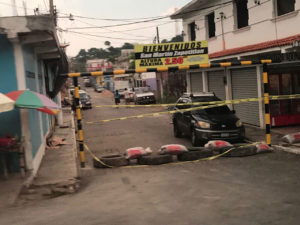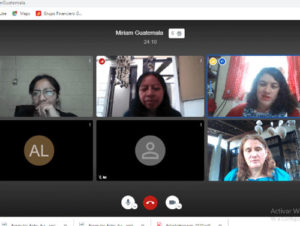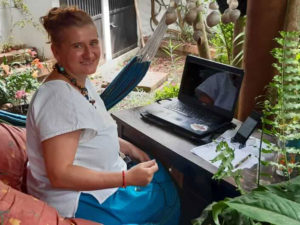Make Your Experiences Count. They Can Change the World.
LET’S BRING ALL OF OUR KNOWLEDGE AND EXPERIENCES TOGETHER.
TOGETHER WE KNOW MORE. TOGETHER WE ACHIEVE MORE. TOGETHER WE DO BETTER.
LET’S BRING ALL OF OUR KNOWLEDGE AND EXPERIENCES TOGETHER.
TOGETHER WE KNOW MORE. TOGETHER WE ACHIEVE MORE. TOGETHER WE DO BETTER.
Published: June 8, 2020
Since the beginning of the Corona Crisis certainly a lot has changed. The goal of this article is to take a closer look at the realities of the daily working routines of our TAs and at the implications for knowledge management. Since digitalization processes cannot be neglected when talking about knowledge transfer, it is also important to mention that access to technology, networks and education are a pre-condition for functioning exchanges in the digital age.
The questions we asked were: how has the work of TAs in Central America changed due to travel restrictions and the resulting ‘home office’? Did new digital tools emerge and how are they used and perceived? To get a better idea about the working environments of TAs in these times, I conducted a small survey among my colleagues in Central America and I would like to share the results here.
Thank you to all colleagues from Central America for your participation!
 The common answer to this question was that this special situation of course changes the working situation. Depending on the field of work or area of expertise of each TA, the answers slightly differ though. The exchange and cooperation with the colleagues and counterparts from Partner Organization has always been and still is -regardless of the new conditions – a major part in the work of TAs. The main difference, however, is the lack of direct exchange (workshops, meetings, trainings), the dependence on the availability of technical solutions and a good internet connection (from all involved actors), the ambivalence of information overload and information-loss and the psychological stress that is caused by the current crisis. Planned activities can’t be carried out, beneficiaries are out of reach, sensitive topics can’t be discussed as comfortable via online platforms and more. Extra costs emerge resulting from the extended exchange online, where much more data than usual is used.
The common answer to this question was that this special situation of course changes the working situation. Depending on the field of work or area of expertise of each TA, the answers slightly differ though. The exchange and cooperation with the colleagues and counterparts from Partner Organization has always been and still is -regardless of the new conditions – a major part in the work of TAs. The main difference, however, is the lack of direct exchange (workshops, meetings, trainings), the dependence on the availability of technical solutions and a good internet connection (from all involved actors), the ambivalence of information overload and information-loss and the psychological stress that is caused by the current crisis. Planned activities can’t be carried out, beneficiaries are out of reach, sensitive topics can’t be discussed as comfortable via online platforms and more. Extra costs emerge resulting from the extended exchange online, where much more data than usual is used.
Obviously working from home voluntarily for a self-defined time is not the same as being forcefully shut-down. Selfcare for body and mind are critical but hard to perform, if freedom is restricted and working alone online can lead to a certain ‘zoom-fatigue’. Private- and work hours merge and productivity can be affected by various distractions. The positive outcomes are that there might be time for strategic planning, reporting and evaluation.

For direct one-to-one communication not much has changed: Email, telephone and WhatsApp (as well as Signal, Skype, Telegram, Messenger) always seem to be the first choice for connecting TAs in their networks. Especially, if just a mobile connection is possible, WhatsApp is the channel of choice for calls and text messages. Screen-sharing and online conference platforms are used extensively during the lockdown. For group calls Skype, WhatsApp and Zoom are the most used tools, which does not mean that they are the preferred choices. As Zoom has been heavily criticized for their lack of privacy protection it has lost its trustworthiness for conference calls, where sensitive topics (i.e. human rights defence) are discussed. Furthermore, it was reported that sexist and pornographic ‘attacks’ happened during calls (zoom-bombing). Other mentioned applications were Nextcloud-Talk and Bluejeans (paid services) and Jitsimeet (open source). Google opened up Google Meet (which was limited to GSuite users only) to the public and until end of September the owners of a Google Account can use the conference app without time limitation. The advantage is the usability and accessibility, especially because Google Accounts are widely in use in Central America, the downside is the dependency of this one big company. Common ground is that one can get a bit lost in the jungle of all the offers and platforms and it can sometimes be hard to find a suitable platform for certain calls. The topic of access and availability again is of relevance, since the best platforms are not for free, nor is the data/bandwidth that is used for the calls.

A lot of virtual conferences, trainings, discussions, talks etc. about various topics are provided and some of them are even accessible time independent (i.e. Recordings on Facebook or YouTube). Unfortunately, there is not one source or overview of them – in the contrary, these events are shared in various WhatsApp groups, Newsletters, Facebook pages etc.; so the danger of information overload and overwhelmed staff comes in.
Sports and self-care, fresh air, movement, relaxation, dancing and a certain structure of the day, which helps to separate working- from spare time, can help to cope with the situation. Valid news sources and the knowledge of trustworthiness are also important, especially in Nicaragua it seems hard to get information about the situation. Therefore certain skills in interpretation of different sources (governmental and non-governmental., i.e. El Confidencial, El 19, articulo 66, despacho 505) are required. Other sources, such as the Coronabarometer and the NDR-Podcast with virologist Dr. Christian Drosten were recommended.
Relationships with colleagues from the Partner Organisations seem to be highly important. Sharing feelings and emotions, listening and helping each other, humour, mutual understanding and solidarity are more important than ever and this seems to be the best resource.
Once these digital tools are established, one could think that in terms of (cost-)efficiency many face to face activities could be held online in the future. For example, travel to events could be avoided, the organisation and even documentation of the latter would be easier and therefore projects could use their resources for different activities.
The question is, if the current situation leads to sustainable changes in working environments in the future? This is hard to predict, but we know that human beings need interpersonal exchange and that knowledge isn’t only transmitted virtually. A Community of Practice needs the theory as well as the practice, networks and friendships can’t be exclusively built online.
What do you think, how will the Technical Advisory Programme change?